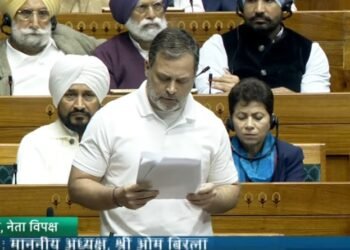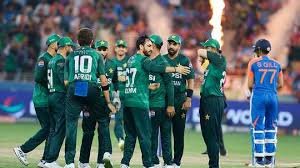The Pahalgam attack, claimed by a Pakistan-backed terror group, has triggered international condemnation and renewed security concerns in Jammu and Kashmir. As India grapples with grief, political debates intensify, and the government’s resolve is put to a severe test.”
BY PC Bureau
April 24, 2025
Madhubani, Bihar – In his first public address following the deadly terror attack in Pahalgam, Jammu and Kashmir, Prime Minister Narendra Modi delivered a strong message from Madhubani, Bihar, on Thursday. Addressing a National Panchayati Raj Day event, Modi assured the world that India would “identify, track, and punish” those responsible for the April 22 massacre that claimed 26 lives, primarily tourists. Speaking in English, the Prime Minister emphasized India’s unwavering determination to combat terrorism.
“Today, from the soil of Bihar, I say to the whole world: India will identify, trace, and punish every terrorist and their backers. We will pursue them to the ends of the Earth. India’s spirit will never be broken by terrorism,” asserted Modi, his resolute tone met with applause.
The Prime Minister’s decision to speak partly in English, a departure from his usual Hindi, underscored the global implications of India’s fight against terrorism, particularly after the deadliest attack in Jammu and Kashmir since the 2019 Pulwama incident. The Pahalgam attack, executed by The Resistance Front (TRF), a proxy for the Pakistan-based Lashkar-e-Taiba (LeT), targeted tourists in the scenic Baisaran meadows, resulting in the deaths of 26 civilians, including two foreign nationals, and injuries to several others.
Prior to his address, Modi led the gathering in a two-minute silence to honor the victims, poignantly chanting “Om Shanti.” “The entire nation is saddened by the brutality with which terrorists killed innocent civilians in Pahalgam. We stand with the families of those we lost,” he stated, requesting the audience to remain seated in reflection.
Madhubani, Bihar: Prime Minister Narendra Modi says, “In this terrorist attack, some lost their son, some lost their brother, and some lost their life partner. Among them, some spoke Bengali, some Kannada, some Marathi, some Odia, some Gujarati, and some were from Bihar. Today,… pic.twitter.com/PLgqneK3i0
— IANS (@ians_india) April 24, 2025
ALSO READ: How the IWT Suspension Fits India’s Post-Pahalgam Security Calculus
Nation Mourns, Government Acts
The Pahalgam attack has evoked widespread grief and anger across India. Among the deceased were a naval officer, an Intelligence Bureau official, and a Nepali national, highlighting the indiscriminate nature of the assault. Intelligence agencies have identified Saifullah Kasuri, a key LeT commander, along with two Pakistan-based operatives, as the masterminds behind the attack. Sketches of three suspected Pakistani terrorists—Asif Fauji, Suleman Shah, and Abu Talha—have been released, accompanied by a ₹20 lakh reward for information leading to their capture.
The Indian government has responded with decisive measures. Prime Minister Modi cut short his diplomatic visit to Saudi Arabia on April 22 to convene an emergency meeting of the Cabinet Committee on Security (CCS) in Delhi. The CCS announced a five-pronged retaliatory strategy, including the potential suspension of the Indus Waters Treaty, closure of the Attari border post, expulsion of Pakistani military attaches, and a downgrading of diplomatic ties with Pakistan. Home Minister Amit Shah visited Srinagar to assess the situation, and the National Investigation Agency (NIA) has deployed teams for investigation.
ALSO READ: Silencing Hate-mongers: Heroism and Humanity in Pahalgam’s Dark Hour
The attack has also ignited political debate. Opposition parties, including Congress and the Rashtriya Janata Dal (RJD), criticized the timing of Modi’s Bihar visit amidst national mourning. The RJD alleged that the state administration pressured local officials to mobilize crowds for the event, posting on X, “The pyres of the victims have not yet been lit, but the Prime Minister is campaigning in Bihar,” labeling it an “undeclared emergency.” Conversely, Janata Dal (United) leaders chose to attend the Madhubani event over an all-party meeting in Delhi, pledging their support for the government’s actions.
Development Initiatives Amidst Crisis
Despite the somber atmosphere, Modi proceeded with the Madhubani event to launch development projects worth over ₹13,480 crore, underscoring his government’s commitment to Bihar’s progress ahead of the 2025 state assembly elections. Key initiatives included an LPG bottling plant in Gopalganj, power projects valued at ₹1,170 crore, and upgrades to rail infrastructure, such as the Amrit Bharat Express (Saharsa-Mumbai) and Namo Bharat Rapid Rail (Jaynagar-Patna). He also distributed ₹930 crore to over 2 lakh Self-Help Groups under the Deendayal Antyodaya Yojana and handed over sanction letters to 15 lakh new beneficiaries of the Pradhan Mantri Awas Yojana-Gramin (PMAY-G).
Addressing the Panchayati Raj Institutions (PRIs) and gram sabhas, Modi emphasized rural empowerment, highlighting that over 2 lakh panchayats have gained internet connectivity in the past decade, facilitating digital access to essential documents. “Bihar is the land where Bapu began his Satyagraha. His belief was clear: India’s development lies in the development of its villages,” he stated, drawing a historical parallel to emphasize the significance of grassroots governance.
ALSO READ: How Terrain and Lack of Security Turned Tourists into ‘Sitting Ducks’
Global Condemnation and Domestic Resolve
The Pahalgam attack has been met with widespread international condemnation. Leaders such as US President Donald Trump, Australian PM Anthony Albanese, and Israeli PM Benjamin Netanyahu expressed their solidarity. Sheikh Mohammed bin Abdulkarim Al-Issa, Secretary General of the Muslim World League, also condemned the attack during a meeting with Modi in Jeddah. Modi expressed his gratitude to the global community, affirming, “Everyone who believes in humanity is with us.”Domestically, the attack has reignited discussions regarding security in Jammu and Kashmir. Opposition leaders, including Rahul Gandhi, have called for an all-party meeting and questioned the government’s claims of normalcy in the region following the 2019 revocation of Article 370. Security agencies have heightened surveillance in border districts like Madhubani and Darbhanga, citing past activities of separatist sleeper cells.
In his Madhubani address, Modi struck a defiant tone amidst national mourning. “The willpower of 140 crore Indians will break the back of the masters of terror,” he declared, promising a punishment “beyond their imagination.” This vow, delivered from a state with a history of resistance, signaled not only retribution but also a broader vision of a nation unyielding in the face of violence.
However, questions remain about the efficacy of India’s security apparatus in delivering on Modi’s pledge given the complex regional dynamics. The potential impact of diplomatic measures against Pakistan and the risk of escalating tensions also loom large. As candlelight vigils are held in Srinagar and families across India grieve, the nation’s resolve faces a significant test, one that Prime Minister Modi insists India will overcome.














